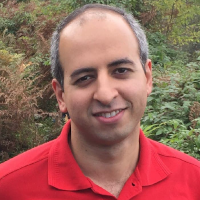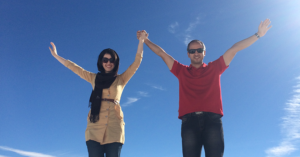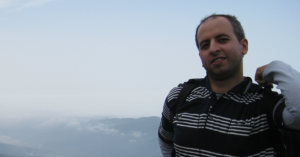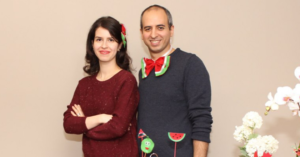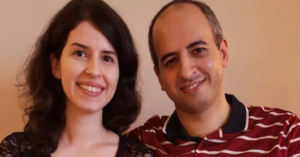Mohammad Abaspourqadi
They Dance in the Mountains
Mohammad writes:
“I am Taro Misaki, second to Captain Tsubasa; I am Dennis Bergkamp, second to Thierry Henry; I am a tonbak, second to the santur. I am the second. The second guy. All my life, in all stories, in all cartoons, in all events, I go nowhere near the main guy. I always look for the second guy. With all my power, I look for the second guy. I have never been the first hero in any story. I have always been the second.
“I wanted to be second. Being second was my place. Maybe even more lovable than the first. When I look back at my life, at my years of childhood, I see that never, not in simulation games, not in heroic tales, not in games of childhood, was I ever the first guy. I wasn’t Tsubasa, I was Taro. In my football team, Henry astonished all but I prefered Bergkamp who was a line behind, giving assistance to the strikers.
“They once asked me to head an association at university, to be its number one person. I didn’t accept. I become the deputy in the same association. When it came to musical instruments, I chose to play the tonbak, which is secondary to others. The tar and santur are the heroes in music; but I am the tonbak, that second sound, whether you like it or not.”
Write to me, Mohammad.
Write to me from beyond the clouds. Just like in those days, so that I can read you, drink in your words and go over your stories again, in search of some calm. Write to me and tell me, on the other side of the long line of darkness, whether now that you, together with you gorgeous darling, are the first people, the first bright green signs in our red grief, you still prefer to be the second?
Write to me, Mohammad.
Are you still worried for your homeland? Do you still think you have left it alone? Do you remember you said you couldn’t talk about your country after you left it? What a mad lover of this Iran of ours you were. What do we do now with the stones, woods and mementos that you collected for yourself from the different regions of Iran? You said these stones would be diamonds and jewels to you, wherever you went. What did they do with the stones and mementos you always carried in your luggage? This time, let me ask, on which soil did the stones fall from your lovely hands? The Persian poet Saadi says that stones cry when a beloved leaves. Where are those stones now? In which land are they crying?
Write to me, Zahra.
Write to me and tell me, what did you do with your love of seeing the world? Do you remember you said that the lines of your father’s face were kind because he smiled at you so much? Tell me, what should he do now, with the deep lines of his forehead? With the constant moisture in his eyes?
Write to me and tell me, are you still clamoring for the leaves of autumn? Do you remember your last day on earth, when you said “Looking at the mountains gives me a deep feeling of suspension”? Our beautiful, beautiful mountain. When we look at it now, we are all tears. Write for me and tell me, are you still in love with the Alvand mountains? Do you remember when you wrote, “Whenever I look at Alvand, I know why my ancestors stopped here as they were passing through. They had to stay. Now that I am far from it, it is the symbol of all that I miss.”
How can the mountains you loved forget the echo of Mohammad’s laughter? How can the fields forget how passionately the two of you ran and jumped together? You, the kindest friends of nature.
Write to me, Zahra.
Do you remember how, from the first day after you got your masters degree in civil engineering from K. N. Toosi University of Technology as the top student in your class, you became a professor who loved her students? Do you remember resisting all the pressure to not give anyone falsified grades? Remember how you and Mohammad decided to move to Canada to continue your work and research?
Write to me and tell me, are you still worried for the world? What days and nights did you spend researching and working to bring down energy use in greenhouses? Now your research is lying in a lab, awaiting your return. No one knows how to fill your shoes, Zahra. Maybe no one knows how to tame the greenhouses so they expend less energy. No one was surprised that you tamed the greenhouses. You tamed the world around you with your kindness.
Look now. Which greenhouse are you now? We can’t even see you. How can we believe all that passion for improving the world is gone? How can we believe that of all the efforts and civil projects Mohammad did in a company in Canada, only a memento stone will stand in that company forever?
What can we do with Mohammad’s letter of acceptance from Canada’s engineering association? The one you got one night – before you got on that plane. How can we believe all that passion for building a better tomorrow is gone now?
Write to me, Mohammad. Write to me, Zahra.
Write for me seven years of your pure tale of love; from when you met to how you flew to the heavens, like classic lovers. A flight that broke the heart of the world. You loved life and, as Mohammad said, you preferred to be the second characters and not the protagonists of a bitter drama whose unfulfilled wishes make the story. Write to me and tell me: is love, as you experienced it, truly the elixir of content and happiness? What was the secret of content given to you and denied to us? We, this primitive tribe of grief?
Zahra, write to me and tell me, in the quietness of your kind heart, do you still knit scarves for Mohammad so he can be warmed with love in the cold of winter? Are you still made jubilant by the words of his heart that Mohammad wrote for you in a notebook?
Zahra, write to me and tell me, do you not miss greeting your favorite tree? The one you used to greet since childhood? The tree that still awaits your greeting. How about you, Mohammad? Do you not miss the scent of orange blossoms in the alleyways of Babol? Mohammad, write to me and tell me, do you still like to watch Arsenal play? Where are your precise analyses of football? You were wonderful in analysis because you had read so much. Now write to me and tell me, how do we analyze the story of your departure which leaves us in rage and confusion?
Do you remember the suitcase full of books you took to Canada? We still don’t know, where is your sitar manual? The one you took with you along with your other books. Didn’t you want to learn the Neynava album of Master Alizade and play it for us? Wasn’t your book, which was burnt, just like our hearts, an object of interest for journalists? They burnt that too. Maybe you knew you would be the first person in the story this time. Maybe that’s why you left us the tonbak, that instrument you said was like “the second guy”.
Zahra, write to me and tell me, with your beautiful lover, Mohammad, where in the vast dominion of the heavens did you put down your Haft-sin of paradise so that the missiles couldn’t reach it? Write for me of the day when the wild olives of your Haft-sin were burnt in the heavens. To which world did you take the spring with you? Our world didn’t have a spring this year.
Mohammad, do you remember writing, “It doesn’t matter how one lives; what matters is where one is buried, where one turns to ashes”? Do you know what the writings you left for us are doing to our hearts? One day you wrote, “I have willed that after my death, my body should be buried under a bitter orange tree so that its scentful blossoms can fall on my grave every spring. This will shall be credible only to the moment I die. After that, there is nothing. It doesn’t matter.”
That day, we could never imagine we’d have to do this in the spring of your youth. Now, at the age of 33, you will be visited by the orange blossoms.
Write to me, Mohammad. Write to me, Zahra. I am so afraid of the silence that will follow your departure…
Writer: Hamid Salimi
Translator: Arash Azizi
Editor: Hannah Somerville
With the support of iranwire.com
